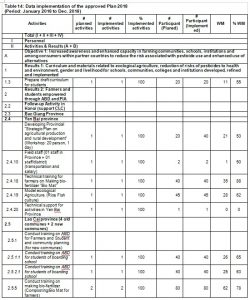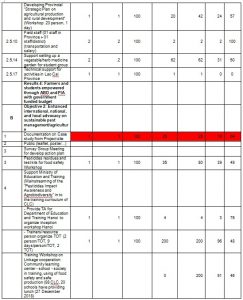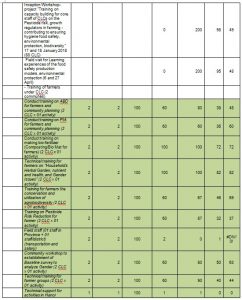Rural Ecological Agriculture for Livelihoods (REAL) VIET NAM
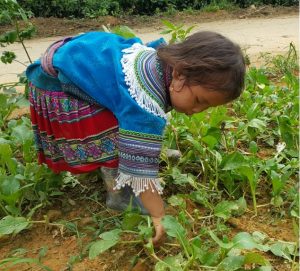
Final Report 2013 – 2018
Initiatives for Community Empowerment on Rural Development (ICERD) Number 14, Alley 54/1, Bui Xuong trach Street – Khuong Dinh, Thanh Xuan – Hanoi
I. PROJECT OVERVIEW
| 1. Title of Project | Rural Ecological Agriculture for Livelihoods Project |
| 2. Project Area | Bac Giang, Hanoi, Quang Binh, Lao Cai, Ninh Binh and Yen Bai |
| 3. Implementing organization | Initiatives for Community Empowerment on Rural Development (ICERD) |
| 4. Funded Agency | Field Alliance (Thai Education Foundation) |
| 5. Total funding approved | |
| 6. Duration | 2013 – 2018 |
Contents
I. PROJECT OVERVIEW
List of tables, Figures, Pictures of Final Report_REAL – ICERD 2013-2018
II. Background
2.2. Impact data on reduction of pesticide, improvement of pesticide management
Management of pesticide containers
2.3. Sustainable conservation and utilization of agrobiodiversity
2.3.3. Apply Sustainable rice intensification response to climate change
2.3.5. Schools are maintaining the conservation and utilization of agrobiodiversity
2.3.6. Linkage the conservation of indigenous vegetables with the production and marketing
2.3.7. Activities conducted by Students
2.3.8. Club and Cooperative formed by FFS alumna
2.4. Addressing the cross-cutting issues “gender, poverty, Human rights”
2.4.1. Develop FFS training curricular 22
2.4.2. Organize FFSs and workshops on cross-cutting issues
2.5. Publication (leaflet, poster…)
2.6. Documentation on case study from Project site
2.7. Mobilize Human resources support to REAL Project
2.7.1. Human resources within targeted provinces support to REAL Project
2.7.2. Institutions involved in REAL
2.9.1. MoET & ICERD Workshop on connect cooperation for Food safety
2.9.2. Refresher Training of Trainers (R-TOT)
2.9.3. MoET & ICERD’s Inception Workshop of the Project on Building capacity for CLC on PIA, ABD
2.9.4. Pesticides residues and test kits for food safety Workshop
2.11. Policy advocacy and strengthening pesticide management
2.12. Support young farmer generation
3.1. Lesson learned, recommendation
1.1. Training activities in 2018 (with all funding sources)
1.2. Target communities/Community Learning Center (CLC)/Schools in 2018 (with all funding sources)
| List of tables, Figures, Pictures of Final Report_REAL – ICERD 2013-2018 |
| Table 1a: Community/CLC, school, farmers and students trained from 2013 – 2018 – REAL-2013-2018 (with all funding sources) |
| Table 1b : Commune, Schools, Community Learning Center (CLC) participated and maintained REAL’s activities with supported by different Sources – REAL 20013 – 2018 |
| Table 1c: Teachers participated in the REAL Program from 2013 – 2018 – REAL-2013-2018 |
| Table 1d: Name of communes carried out ABD, PIA in target Area – REAL 2013-2018 |
| Table 2a: Amount chemical pesticides used on plants (YEAR 2016 and 2017 in BAC GIANG) |
| Table 2b: Amount chemical pesticides used on different plants (YEAR 2016 and 2017 in YEN BAI) |
| Figure 1a: Pesticides reduced after one year received trainings in Yen Bai province (received training in 2016, data survey in 2017) |
| Table 2c: Amount chemical pesticides used on plants (YEAR 2016 and 2017 in LAO CAI) |
| Figure 1b: Pesticides reduced after one year received trainings in Lao Cai province (received training in 2016, data survey in 2017) |
| Picture 1: Mobilize community funds to build cement tanks for disposal pesticide containers in Lao Cai province |
| Picture 2: Pesticide containers are collected for disposal in Lao Cai province |
| Table 3: Sustainable conservation and utilization of agrobiodiversity – REAL 2013 – 2018 |
| Picture 3: A couple Mr. Pham Xuan Chien and Ms. Nguyen Thi Nga from Quynh Son village – Yen Dung District, Bac Giang province applies Intergrated [Rice-Fish-Duck] cultivation. |
| Table 4: Yields and benefits from rice only and integrated rice-aquatic biodiversity production systems – REAL-2013-2018 |
| Figure 2: Indicate the Gross incomes from rice only and integrated rice-aquatic biodiversity production systems (US$/ha) – REAL-2013-2018 |
| Table 5. Comparison in (production cost, income, benefit) between no-till and (traditional practice with tillage) in potato production in My Thanh – My Duc, Hanoi 2018 – REAL-2013-2018 |
| Picture 4: Model “Rice with soy beans rotation (zero tillage on soybean)” applied in My Thanh Commune, My Duc District of Hanoi since 2016. |
| Table 6a: The Area and Farmer household involved in the Sustainable rice intensification response to climate change – REAL-2013-2018 |
| Table 6b: Impact data of Sustainable rice intensification & response to climate change – REAL-2013-2018 |
| Picture 5: Woman in Hamlet Xuan An, Commune Xuan Phu Apply “Bio-mats” in chickens |
| Picture 6: Cooperative members making compost (Lao Cai) |
| Picture 7: Boarding school students grow variety of indigenous vegetables and raise livestock to serve daily meals and products were sold to buy books, learning materials |
| Picture 8: Students School created the medicinal herb garden is a place for students to learn. Students also grow herbal garden at home. |
| Table 7: Co-operative conservation and production of indigenous vegetables and market access in Lao Cai |
| Table 8: Students and Youth Union organized the environment events – REAL 2013-2018 |
| Table 9: Number of clubs / cooperatives are operating – REAL-2013-2018 |
| Table 10: Number of communes, Woman & Man attended Gender Workshop – REAL 2013-2018 |
| Table 11: Participation of men and women in Crop cultivation, Take care of children, Household jobs in Bac Giang, Lao Cai, Yen Bai and Quang Binh |
| Table 12a. Human resources support to REAL Project |
| Table 12b: Institutions involved in REAL |
| Table 13: Community/CLC, school, farmers and students trained in 2018 (with all funding sources) |
| Table 14: Data implementation of the approved Plan 2018 (Period: January 2018 to Dec. 2018) with funding from REAL only |
II. Background
The Center for Initiatives on Community Empowerment and Rural Development (ICERD) is a Vietnamese Civil Society Organization (CSO) supporting poor rural communities to sustainably manage their own livelihoods. Our success is underpinned by our holistic approach to development, spanning from grassroots capacity building to national advocacy.
Founded in June 2012, under the auspices of the National Program on Integrated Pest Management (IPM) – Ministry of Agriculture and Rural Development (MARD) and the Field Alliance (Thai Education Foundation), The Center for Initiatives on Community Empowerment and Rural Development has played a prominent role in capacity-building for sustainable agriculture in Vietnam.
ICERD is officially registered as member organization of the Vietnam Union of Science and Technology Associations (number 353/QĐ-LHHVN dated 01 June 2012).
With assistance of the Field Alliance a (Thai Education Foundation), since 2013 ICERD has supported the communities from six provinces (Hanoi, Bac Giang, Ninh Binh, Quang Binh, Lao Cai and Yen Bai) to develop The Community Program on “Rural Ecological Agriculture for Livelihoods” within the Sida funded regional program “Towards a non-toxic environment in South-East Asia”.
The program has been involving farmers, students and local institutions aiming at improving the livelihoods of the rural communities. The Commune People’s Committee manages the program, and Community Learning Center (CLCs) coordinate the implementation of the program activities.
ICERD has supported the Community program in collaboration with the government agencies including: Department of Continuing Education – Ministry of Education & Training, The Department of Plant Protection (PPD)- Ministry of Agriculture and Rural Development (MARD), National Institute of Occupational and Environmental Health – Ministry of Health; Centre for Organic Agriculture – Vietnam National University for Agriculture, and also collaboration with FAO Asia Regional Program on IPM/Pesticide Risk Reduction.
Activities on Pesticide Impact Assessment (PIA) and Sustainable Conservation and Utilization of Agrobiodiversity (ABD) are implemented by REAL and promoted expansion the adoption in 46 schools and 111 CLCs within 111 communes of 6 provinces (Bac Giang, Ha Noi, Lao Cai, Ninh Binh, Quang Binh, Yen Bai).
More than 319 Institutions involved in REAL: Provincial Department of Agriculture and Rural Development (DARD), Provincial Crop Production and Plant Protection (CP&PPSD) – DARD, Provincial Continuing Education Centers, Provincial Extension Center (AFEC), District People ‘committee, District Education and Training Office, District Continuing Education Centers, District Agriculture Office, District Extension Center, Communal People ‘committee, Communal Woman Union, Communal Farmer Union, Communal Youth Union, Community Learning Centre (CLC), School. National level: MARD (Plant Protection Department, National Agricultural Extension Center); Ministry of Education & Training (Department of Continuing Education); Ministry of Health (Environmental Health Agency, National Institute of Occupational and Environmental Health); Research Institute and Enterprise (The Center for application of the advanced environmental technology – Vietnam National University of Agriculture, Thai Nguyen University); International organizations/NGO, CSO [The Field Alliance (TFA), FAO Regional IPM/Pesticide Risk Reduction Program, Mekong Extension Learning Alliance (MELA), Agroecology Learning alliance in South East Asia (ALiSEA), Centre for Sustainable Rural Development, Research Centre for Gender, Family and Environment (CGFED)].
III. Activity Implementation
1. PROJECT SITE
There are 6 provinces that have been implemented Project REAL since 2013 (Bac Giang, Ha Noi, Ninh Binh, Quang Binh, Lao Cai and Yen Bai). Of these 6 provinces, 4 provinces funded by REAL, namely Bac Giang, Lao Cai, Yen Bai, and Hanoi. The other two provinces Ninh Binh and Quang Binh projects terminated support since 2016, but in these two provinces, communes and schools still maintain ABD trainings and sustainable conservation and utilization of agrobiodiversity with their own resources. Lao Cai is bordering with Yunnan province of China, Lao Cai is far from Hanoi about 300 km, Lao Cai farmers participating in project consist of majority and minority ethnic groups “Tay and H’Mong”; Yen Bai is the northern mountainous provinces and bordering with Lao Cai province, it is about 180 km far from Hanoi to the north west, Yen Bai farmers participated in REAL project are mainly minority ethnic group “Thai, and Muong”; Quang Binh is located in the North costal centre, 600 km far from Hanoi on the south, Quang Binh as highly suffer by typhoon and climate change; Bac Giang province is belong to the northern midland and mountainous provinces, it is far from Hanoi about 70 km in the north, farmers participated in REAL project is majority people; Ninh Binh province is belong to Red river delta, it is far from Hanoi is about 100 km on the south, farmers are majority group. See the Map.
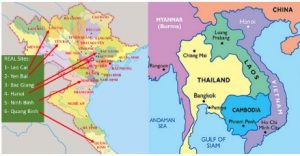
2. PROJECT KEY DATA and cumulative figures from 2013 – 2018
With assistance of the Field Alliance a (Thai Education Foundation) Since 2013 ICERD has supported the communities from six provinces (Hanoi, Bac Giang, Ninh Binh, Quang Binh, Lao Cai and Yen Bai) to develop The Community Program on “Rural Ecological Agriculture for Livelihoods” within the Sida funded regional program “Towards a non-toxic environment in South-East Asia”.
The program has been involving farmers, students and local institutions aiming at improving the livelihoods of the rural communities. The Commune People’s Committee manages the program, and Community Leaning Center (CLCs) coordinate the implementation of the program activities.
ICERD has supported the Community program in collaboration with the government agencies, research institute including: MARD (Plant Protection Department, National Agricultural Extension Center); Ministry of Education & Training (Department of Continuing Education); Ministry of Health (Environmental Health Agency, National Institute of Occupational and Environmental Health); Research Institute (The Center for application of the advanced environmental technology – Vietnam National University of Agriculture); and also collaboration with FAO Asia Regional Program on IPM/Pesticide Risk Reduction.
2.1. Commune, Schools, Community Learning Center (CLC) participated and maintained REAL’s activities with supported by different Sources
With assistance of the Field Alliance a (Thai Education Foundation), since 2013 ICERD has supported the communities from six provinces (Hanoi, Bac Giang, Ninh Binh, Quang Binh, Lao Cai and Yen Bai) to develop The Community Program on “Rural Ecological Agriculture for Livelihoods” within the Sida funded regional program “Towards a non-toxic environment in South-East Asia”.
Target communities/Community Learning Center (CLC)/Schools (2013 – 2018)
Since 2013 to 2018 activities on Pesticide Impact Assessment (PIA) and Agrobiodiversity Conservation and Utilization (ABD) are implemented by REAL and promoted expansion the adoption in 46 schools and 111 CLCs within 111 communes of 6 provinces (Bac Giang, Lao Cai, Ninh Binh, Quang Binh, Yen Bai).
In a total of 111 communes / Community Learning Center (CLC) now are maintaining PIA, ABD activities, there are 23 communes/CLCs were supported by REAL and are now sustaining, the remaining 88 communes / CLC within Ha Noi province, began to implement PIA and ABD activities since 2018 with Hanoi’s funding, but technical assistance provided by REAL Project.
Among 46 schools now are maintaining PIA, ABD activities, there are 26 schools (including one boarding school, and two Schools within District Continuing Education Center) were supported by REAL and they are now sustaining; remaining 20 schools /semi-boarding schools began to implement PIA and ABD activities since 2018 with Hanoi’s funding, but technical assistance provided by REAL Project (Table 1a).
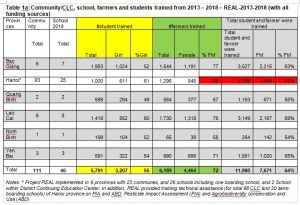
Training activities (2013 – 2018) with all funding sources
Since 2013 – 2018 with all funding sources there were 11,980 students and farmers of which 7,671 female (64% female) have participated in FFSs, PIA, ABD and have been maintaining of the sustainable conservation and utilization of agrobiodiversity. In which 5,791 students (3,207 girls, 55% girl); and 6,189 farmers (4,464woman, 72% woman) (Table 1b).
In addition, students have the linkages with parents and other farmers to influence them on pesticide risks and solution to pesticide risk reduction.
The Commune, Schools, Community Learning Center (CLC) participated and maintained REAL’s activities with supported by different Sources (See Table 1b bellow).
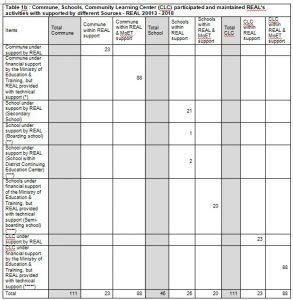
Farmers confirmed that each FFS alumna farmer can assist for two to three other farmers in community to apply PIA/ABD/SRI, thus it is at least 12,000 farmers and over 10,000 students as part of the PIA/ABD network.
Organized Training for Trainers (TOT) on “Agro Biodiversity Conservation and Utilization and Pesticides Impact to Health and Environment” for 96 governmental staff, from the Plant Protection Department and Department of Continuing Education/Non-formal Education under the Ministry of Education and Training. In addition, training was organized on “Initiatives for Community Empowerment and Rural Development”, from four provinces: Bac Giang, Lao Cai, Ninh Binh and Yen Bai, including the District’s Continuing Education Centre & District Plant Protection Station, extension workers from three provinces (Lao Cai, Ninh Binh, Yen Bai), government staff, and high school teachers (Table 1c).
The teachers participated in the REAL Program from 2013 – 2018 – REAL-2013-2018 (See Table 1c below).
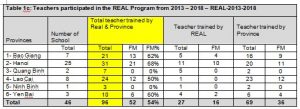
The Name of communes carried out ABD, PIA in target Area – REAL 2013-2018 (See Table 1d bellow)
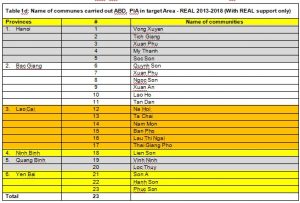
2.2. Impact data on reduction of pesticide, improvement of pesticide management
Amount chemical pesticides used on plants (YEAR 2016 and 2017 in BAC GIANG) (See Table 2a below).

Data in Table 2a show that farmers in targeted area in Bac Giang receive training on agricultural biodiversity conservation, SRI, IPM, and conducted pesticide impact assessment, the pesticide use of considerable reduced. On vegetables reduced 94%, rice decreased by 20% and on cabbage by 58%, on Kohlrabi reduced 78% compared to before training.
Amount chemical pesticides used on different plants (YEAR 2016 and 2017 in YEN BAI) (see Table 2b bellow)

Notes: Pesticides reduced after one year received trainings in Yen Bai province (received training in 2016, data survey in 2017)
Data in Table 2b show that farmers in targeted area in Yen Bai receive training on agricultural biodiversity conservation, SRI, IPM, and conducted pesticide impact assessment, the pesticide use of considerable reduced. On rice decreased by 85% and on maize by 91% compared to before training. (See Figure 1a below).
Figure 1a: Pesticides reduced after one year received trainings in Yen Bai province (received training in 2016, data survey in 2017)
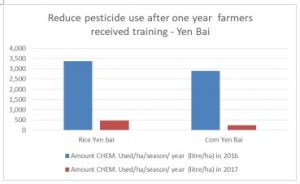
Amount chemical pesticides used on plants (YEAR 2016 and 2017 in LAO CAI) (See Table 2c bellow)

Pesticides reduced after one year received trainings in Lao Cai province (received training in 2016, data survey in 2017) see Figure 1b below.
Data in Table 2c show that farmers in targeted area in Lao Cai receive training on agricultural biodiversity conservation, SRI, IPM, and conducted pesticide impact assessment, the pesticide use of considerable reduced. On vegetables reduced 27%, rice decreased by 86% and on maize by 92% compared to before training. (See Figure 1b below).
Figure 1b: Pesticides reduced after one year received trainings in Lao Cai province (received training in 2016, data survey in 2017)
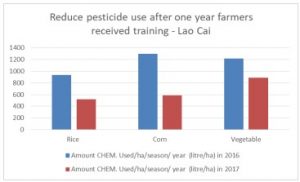
Management of pesticide containers
So far, total of 326 Cement tanks have been constructed for disposal of pesticide containers in 23 communes participating in Project “REAL”, The Women Union and commune People’s Committee has mobilized and encouraged farmers to contribute the money to build the collection tanks of the pesticide containers after use. In addition, Women Union and Youth Union has organized the campaigns “clean environment” collect the pesticide containers. Furthermore, the community commitments on environmental protection have been made.
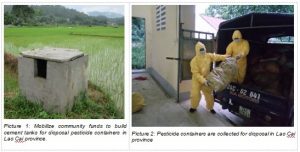
2.3. Sustainable conservation and utilization of agrobiodiversity
Number of “sustainable conservation and utilization of agrobiodiversity” activities have been applied by farmers and students themselves after they graduated FFS on ABD and PIA and related technical trainings. With the facilitation of the women’s clubs, there are 296 households of 4 provinces (Bac Giang, Quang Binh, Ninh Binh and Yen Bai) maintaining apply Rice-Fish; there are 464 households of six provinces (Bac Giang, Hanoi, Quang Binh, Lao Cai, Ninh Binh and Yen Bai) maintaining Integration of vegetables-livestock production ”through bio-mats and composting (Home garden) (Table 3). (See some good stories below).
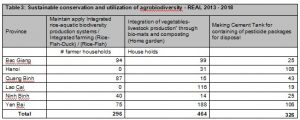
2.3.1. Integrated rice-aquatic biodiversity production systems / Integrated farming (Rice-Fish-Duck) / (Rice-Fish)
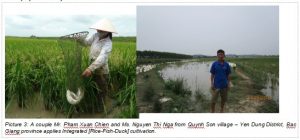
There were 296 households from 4 provinces (Bac Giang, Ninh Binh, Quang Binh and Yen Bai) maintaining integrated farming (Rice-Fish-Duck) / (Rice-Fish).
Steps:
> Organize FFS and organize activities on PIA and ABD
> Organize technical training on integrated rice-aquatic biodiversity production systems.
> Forming team / club
> Practice application of integrated rice-aquatic biodiversity production systems
> Share experiences and promotion for application expansion
The surveys carried out by ICERD showed that farmers in selected sites in Bac Giang and Quang Binh provinces practice rearing fish in rice fields. Data showed that: The average gross income from integrated rice-fish-aquatic production is US$7,751 compared to US$1,892 obtained from producing only rice. Utilization of integrated rice-fish-aquatic biodiversity production practices resulted in average gross income increased ranging from 211%-551% compared with producing rice only (Table 3, Table 4, Figure 2)
The Yields and benefits from rice only and integrated rice-aquatic biodiversity production systems (see Table 4 below).
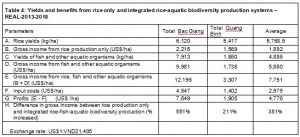
Figure 2 ndicate the Gross incomes from rice only and integrated rice-aquatic biodiversity production systems (US$/ha) – REAL-2013-2018
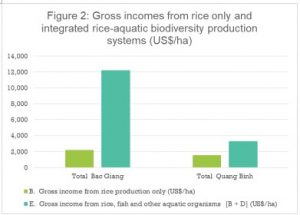
2.3.2. No Tillage Potato / Soybean in Rice-based Farming Systems
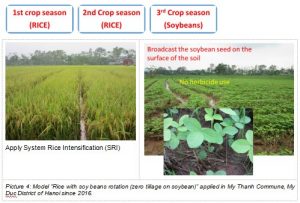
Model has been studied and applied in over 200 ha by nearly 580 households in My Thanh – My Duc – Hanoi since 2016.
Table below so the comparison in (production cost, income, benefit) between no-till and (traditional practice with tillage) in potato production in My Thanh – My Duc – Hanoi 2017: No-till in potato production reduced labor cost by 66%, and reduced total production costs about 22%, while income increased by 21% and benefits about 43% (Table 5) (Picture 4)
Steps:
> Organize FFS and organize activities on PIA and ABD
> Organize technical training on No Tillage Potato / Soybean in Rice-based Farming Systems
> Forming team / club
> Practice application of No Tillage Potato / Soybean in Rice-based Farming Systems
> Share experiences and promotion for application expansion
Comparison (in production cost, income, benefit) between no-till and (traditional practice with tillage) in potato production in My Thanh – My Duc, Hanoi (see Table 5 below).

2.3.3. Apply Sustainable rice intensification response to climate change
Some models of sustainable crop intensification respond to climate change in rice-based farming systems that are applied in large scale in the target communities. For example apply no tillage in Potato / Soybean production in Rice-based Farming Systems, apply System Rice Intensification (SRI).
Currently in the target 17 communities within 6 provinces six provinces (Bac Giang, Hanoi, Quang Binh, Lao Cai, Ninh Binh and Yen Bai) are maintaining the models of sustainable crop intensification response to climate change in rice-based farming systems on an area of over 1,000 hectares, with 3,536 households involved (Table 6a).
> For the System Rice Intensification (SRI), apply SRI the greenhouse gas emissions is reduced due to improvement of water management practices from regular standing water in traditional rice cultivation is replaced by alternating wet and dry irrigation, and due to reducing the use of chemicals. Application of SRI, rice plants become healthier, stronger stems, therefore it increased the resistance capacity to cold, windy and pests. In the case of water shortage SRI’s fields were much better surviving and harvesting than traditional cultivating. In addition, the saving seed by applying SRI, farmers can stockpile it for re-planting for the damaged rice areas due to extreme weather. Average results as compared to the traditional practice: increased natural enemies 27%, increased aquatic animals 22%, increase yield 13%, increase economic efficiency 15%, reduced pesticide 88%, reduce seed 57%, reduce water 31%, reducing chemical fertilizer 21% in comparison to the conventional practices. (Table 6b). Majority of SRI farmers stopped use of chemical (fertilizer and pesticides).
> For the no tillage and mulching with rice straw in potato / soybean production: The use of rice straw for mulching can overcome the burning of straw that causes environmental pollution. In addition, the biomass of rice straw used for mulching will rehabilitate the paddy soil ecosystem. Mulching reduces the need for irrigation. Incorporation of straw/bio-mass into the soil under No till practices sequesters carbon in the soils (i.e. regulating ESS), improves soil structure and puts nutrients back into the soil there by enhances soil fertility and increases water holding capacity of soils and reduces soil erosion (see Table 5. Comparison in (production cost, income, benefit) between no-till and (traditional practice with tillage) in potato production in My Thanh – My Duc, Hanoi).
Steps apply Sustainable rice intensification response to climate change:
> Organize FFS and organize activities on PIA and ABD, Climate change
> Organize technical training on SRI, IPM / no tillage and mulching with rice straw…
> Forming team / club
> Practice application of sustainable rice intensification response to climate change
> Share experiences and promotion for application expansion
The area and Farmer household involved in the Sustainable rice intensification response to climate change(see Table 6a bellow)

Impact data of Sustainable rice intensification & response to climate change (see Table 6b bellow)

2.3.4. Integration of vegetables-livestock production” through bio-mats and composting (Home garden):
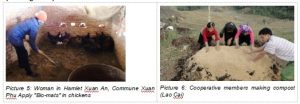
Home garden/”integration of vegetables-livestock production” through bio-mats and composting: Many farms are raising pigs and chickens to serve the nutritional needs of the family and to generate income. However, livestock is usually kept nearby the house and cause pollution. Bio-mats are formed by a mixture of fermented biological agents with biomass and mulch from the floor of the livestock’s stables. This accelerates manure decomposition, and deodorize foul-smelling and poisonous gas from the shed. The residues of bio-mats is ultimately used to make compost as alternative to chemical fertilizer in “home gardens”.
Steps:
> Organize FFS and organize activities on PIA and ABD, Climate change
> Forming team / club
> Organize technical training on Bio-mats, production of the compost, variety of vegetables provides nutrition to improve health
> Practice application of Integration of vegetables-livestock production” through bio-mats and composting (Home garden)
> Share experiences and promotion for application expansion
Over 464 farmer households from 23 communes within 6 provinces (Bac Giang, Hanoi, Lao Cai, Ninh Binh, Quang Binh, Yen Bai) are adopted this initiative (See Table 3: Sustainable conservation and utilization of agrobiodiversity)
Bio mats help to speed up the decompose process of animal residues, and deodorize stinky and poison gas from the shed. Reduce some animal diseases, reduced labor for sanitation (70%) and therefore reduce production input costs, make use of residue of bio-mats to make compost as alternative to chemical fertilizer apply in “home garden”.
Vegetables produced at “home garden” do not use chemical pesticides, no nitrogen fertilizers, or reduce over 80% of chemical fertilizers. In addition to providing a variety of safe vegetables for family’s daily meals, “Home garden” products are also sold at the local safe vegetable markets, restaurants, kindergartens, and staff of the local institutions, offices.
For example, in Xuan An commune – Bac Giang, 18 households have contracts to sell vegetable products to restaurants and safe vegetable shops. In Nghia Lo – Yen Bai, there are 2 clubs provide vegetables for the staff of organizations and offices in the district, and especially to provide regular vegetables to kindergartens.
2.3.5. Schools are maintaining the conservation and utilization of agrobiodiversity
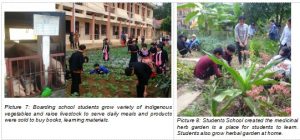
In 26 schools of 6 target provinces (Bac Giang, Hanoi, Lao Cai, Ninh Binh, Quang Binh, Yen Bai), students created the medicinal herb gardens, there were the fields for 5,791 students, of which 3,207 women (55% Female) to learn about the uses of herbs as alternatives to the medicine. Students also grow herbal garden at home (Picture 7, Picture 8).
Over 150 students of Boarding school in Bac Ha District– Lao Cai province grow variety of indigenous vegetables and raise livestock to serve daily meals in school and products were sold to buy the books and learning materials. In training students learn how to make and use of herbal pesticides as alternatives to chemical pesticides on vegetable.
2.3.6. Linkage the conservation of indigenous vegetables with the production and marketing
There are 2 cooperatives (Ta Chai Cooperative and Na Hoi Cooperative) of Bac Ha Dist. Lao Cai province the Minority Ethnic H‘ Mong have maintaining conservation and production of indigenous vegetables and market access. Ta Chai Cooperative, nearly 100 tons of indigenous vegetables obtained each year, the amount equivalent to about $ 51,000 USD / year. Na Hoi Cooperative sold nearly 150 tons of indigenous vegetables obtained the amount equivalent to about $ 81,000 USD/year (table 7). Vegetables were sold through various local markets, and supermarkets in Bac-Ha, Lao-Cai, and mostly, Hanoi city.
Steps:
> Organize FFS and organize activities on PIA and ABD
> Forming cooperatives
> Organize technical training on conservation and production of indigenous vegetables, including preservation and preliminary processing; bio-mats and composting, production of herbal pesticides; Training on market access…
> Practice on conservation and production of indigenous vegetables, market linkage
> Share experiences and promotion for application expansion
Co-operative conservation and production of indigenous vegetables and market access in Lao Cai (See Table 7 bellow)

Ta Chai cooperative has 7 hectares of indigenous vegetable production, production was 97,110 Kg for selling /year, equivalent to $50,831 USD / year.
Na Hoi cooperative has 11 hectares of indigenous vegetable production, production was 149,610 Kg for selling /year, equivalent to $81,118 USD / year.
2.3.7. Activities conducted by Students
Knowledge, skills gained from training on agro-biodiversity (ABD), pesticide risk, and the findings from “pesticide impact assessment (PIA), students of secondary schools organized some activities such as:
Students present to the Commune authorities, Woman Union, Farmer Union the results of student’s survey on PIA, ADB; shared knowledge of ABD. PIA to parents and family members, encouraged parents convert crop production towards environmentally friendly; created of “medicinal plant garden” in school for learning, participated grow “Home garden” for conservation, learning and provide Safe vegetables for family daily meals; organized the environment events to raise public awareness about pesticide impact on health, pollute the rural environment, and launch the action on reduction of pesticide risks, and promote conservation and use of agrobiodiversity.
From 2013 – 2018 there were 20 schools in 6 provinces (Bac Giang, Ha Noi, Lao Cai, Quang Binh, Yen Bai) organizing environment day, with a total of 4,142 participants, including 2,222 woman (54% Woman) participated, consists of Farmers, Students, Teachers, Commune leader, and CSOs (Farmer Union, Woman Union, Youth Union). Over 10,000 trees were planted (Table 8).
Students and Youth Union organized the environment events (See Table 8 below)

2.3.8. Club and Cooperative formed by FFS alumna
After finishing FFSs trainings and with wanting to cooperate in improvement of production, groups of women decided to maintain the momentum created in FFSs by organizing themselves into Club and the cooperative. Club is to organize the “farmer to farmer training”, linkage FFS alumna and maintain experimentation and innovation as well as sharing the knowledge and skills among the community. Depending on the activities that FFS alumna performs, the topics are implemented are also different in each Clubs. The cooperative was established to organize the production and market access for their safe vegetables / organic vegetables, and to conserve the indigenous vegetables.
There were 13 Clubs and 02 Cooperatives formed in the villages of six targeted provinces (Bac Giang, Hanoi, Quang Binh, Lao Cai, Ninh Binh and Yen Bai) with the total members were 460 in which 343 woman (75% woman). (Table 9).
Number of clubs / cooperatives are operating (See Table 9 bellow)
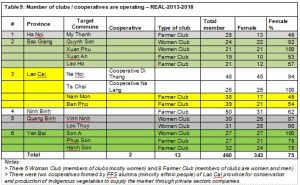
2.3.9. Develop Commune People’s Committee Strategic Plan on PIA and sustainable conservation and utilization of agro-biodiversity.
Within REAL Program, ICERD will continue collaboration with the Departments of Continuing Education – the Ministry of Education and Training, Plant Protection Department (PPD) – MARD, and Provincial Sub Departments of Crop Production and Plant Protection to assist communities to develop commune strategic Plan on agricultural production and rural development, in which activities on pesticide risk reduction and sustainable conservation and utilization of Agro-biodiversity have been absorbed into the mainstream of the plans.
All 23 targeted communes of 6 provinces (Bac Giang, Lao Cai, Ninh Binh, Quang Binh, Yen Bai) that have plans strategic Plan.
To develop Strategic Plan, each commune organized a planning workshop, the plan workshops aimed at discussion and proposing action plans, activities include building capacity for stakeholders, mobilizing resources in order to support farmers’ initiatives and farmer collaboration. Workshop consists farmers, Mass association (Farmers’ Union, Women’s Union, etc.), school, Community Learning Centre (CLC), Commune’s Authorities. At the workshop survey (students and farmers) presented the information/data collected from surveys on pesticide risks and agro-biodiversity and their recommendation as a basis for discussion and planning.
2.4. Addressing the cross-cutting issues “gender, poverty, Human rights”
2.4.1. Develop FFS training curricular
> The curricular regarding “cutting issues” has been developed. The training topics include human rights (children’s rights, women’s rights), gender issues, and climate change, and training topics were integrated in FFS. FFS is applied as a basic approach in training programs within REAL and FFS is a place where men and women to learn together to raise awareness and solve cross-cutting issues (gender, poverty, Human rights, climate change). It is shown in that FFS enhance the bottom-up, demand-driven extension: The FFS gave students, farmers (woman and man) the opportunity to improve their practices, diversify their farms, expand their options; and work together as groups to manage their natural resources. The experiential learning cycle was a central feature in the FFS. The FFS has been shown to creating critical thinking and an attitude of experimentation and innovation.
In each activities the farmers, students (male, female, old, young) all are equal in expressing their thoughts and ideas to contribute to the learning process, field studies, and workshops. And everyone confident to negotiate and present to the authorities, local institutions about the proposal for sustainable program on agrobiodiversity conservation and use, and strengthen the pesticide management in the communities. In addition, students have the linkages with parents and other farmers to influence them on pesticide risks and solution to pesticide risk reduction.
2.4.2. Organize FFSs and workshops on cross-cutting issues
2.4.2.1. Gender, Human rights
The FFS gave students, farmers (woman and man) the opportunity to improve their practices, diversify their farms, expand their options; and work together as groups to manage their natural resources. The experiential learning cycle was a central feature in the FFS. The FFS has been shown to creating critical thinking and an attitude of experimentation and innovation.
In each activities the farmers, students (male, female, old, young) all are equal in expressing their thoughts and ideas to contribute to the learning process, field studies, and workshops. And everyone confident to negotiate and present to the authorities, local institutions about the proposal for sustainable program on agrobiodiversity conservation and use, and strengthen the pesticide management in the communities. In addition, students have the linkages with parents and other farmers to influence them on pesticide risks and solution to pesticide risk reduction.
> During reporting period (2013 – 2018), there were 11,980 students and farmers of which 7,671 female (64% female) have participated in FFS (See Table 1a).
> Total 1,405 women & man, of which 884 women (63% female) participated in 23 “Community workshops on establishment of Baseline survey to analyze Gender” organized in 23 target communes within 6 provinces within (Bac Giang, Lao Cai, Hanoi, Ninh Binh, Quang Binh, Yen Bai). The number of communes, Woman & Man attended Gender Workshop (See Table 10 below).

Workshop was to identify the appropriate ratio of women and man participate in the project activities in the target communities.
> Outputs of Baseline survey to analyze Gender as follow:
Relating to the crop cultivation, in Bac Giang and Quang Binh, primarily undertaken by woman (Bac Giang: 56%, Quang Binh: 53%) while in Lao Cai and Yen Bai province men’s participation in crop cultivation is mostly the same amongst man and woman (Lao Cai man/woman: 48% and 41%; Yen Bai man/woman: 35% and 35%). Some activities under crop cultivation taken by both man and woman together (Bac Giang: 8%, Lao Cai: 11%, Yen Bai: 30%).
Activities regarding taking care of children in all four provinces, mostly taken by woman, they are: Bac Giang (man: 35%, women: 63%); Lao Cai (man: 14%, woman: 68%); Quang Binh (man: 21%, woman: 79%); Yen Bai (man: 18%, woman: 72%).
Regarding household activities, in all four provinces, mainly taken by woman, namely in Bac Giang (man: 18%, woman: 80%); Lao Cai (man: 18, woman: 78%); Quang Binh (man: 9%, woman: 91%).
Number of other activities in the family is mainly taken by woman than man, namely: in Bac Giang (man: 33%, woman: 58%); Lao Cai (man: 31%, woman: 51%); Quang Binh (man: 43, woman: 57%); Yen Bai (man: 42%, woman: 53%). Detail data indicated in Table 11
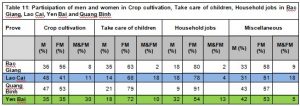
2.4.2.2: Poverty alleviation
The project seeks to stimulate local innovation promoting ecological agriculture and using Farmers’ Field School (FFS) approaches involving smallholder farmers to sustainably improve agricultural productivity and food security for livelihood in the context of climate change adaptation. Poverty alleviation highlight as follow:
> There were 296 households from 4 provinces (Bac Giang, Ninh Binh, Quang Binh and Yen Bai) maintaining integrated farming (Rice-Fish-Duck) / (Rice-Fish). Farmers practice rearing fish in rice fields. Data showed that: The average gross income from integrated rice-fish-aquatic production is US$7,751 compared to US$1,892 obtained from producing only rice. Utilization of integrated rice-fish-aquatic biodiversity production practices resulted in average gross income increased ranging from 211% – 551% compared with producing rice only (Table 4) (Figure 2)
> Over 200 ha with nearly 580 households in My Thanh – My Duc – Hanoi apply No Tillage Potato / Soybean in Rice-based Farming Systems. The comparison in (production cost, income, benefit) between no-till and (traditional practice with tillage) in potato production: No-till in potato production reduced labor cost by 66%, and reduced total production costs about 22%, while income increased by 21% and benefits about 43% (See Table 5: Comparison in (production cost, income, benefit) between no-till and (traditional practice with tillage) in potato production in My Thanh – My Duc, Hanoi.
> There were 3,536 households from 17 communes within 6 provinces (Bac Giang, Lao Cai, Ninh Binh, Quang Binh, Yen Bai) (Table 6a: The Area and Farmer household involved in the Sustainable rice intensification response to climate change) applied “sustainable rice intensification response to climate change” in total area of 1,040 hectares of land each crop season. Average results as compared to the traditional practice: increased natural enemies 27%, increased aquatic animals 22%, increase yield 13%, increase economic efficiency 15%, reduced pesticide 88%, reduce seed 57%, reduce water 31%, reducing chemical fertilizer 21% in comparison to the conventional practices. (See Table 6b: Impact data of Sustainable rice intensification & response to climate change). Majority of SRI farmers stopped use of chemical (fertilizer and pesticides).
> There were 2 cooperatives (Ta Chai Cooperative and Na Hoi Cooperative) of Lao Cai province, the Minority Ethnic H‘ Mong have maintaining conservation and production of indigenous vegetables and market access. Ta Chai Cooperative, nearly 100 tons of indigenous vegetables obtained each year, the amount equivalent to about $ 51,000 USD / year. Na Hoi Cooperative sold nearly 150 tons of indigenous vegetables obtained the amount equivalent to about $ 81,000 USD/year (See Table 7: Co-operative conservation and production of indigenous vegetables and market access in Lao Cai)
2.4.2.3: Climate change issue
Through FFS, there were 6,085 farmers (4.463 women, 73% woman) were raised awareness about climate change, including some causes related to human impact on climate change, especially greenhouse gas emissions raising from agriculture production activities; Negative impacts of climate change are manifested by extreme climate and natural disasters (storms, floods, droughts, heavy rain, hot weather, whirlwinds) to growth, crop productivity, planting, increasing the risk of spreading pests and diseases; solutions to cope with climate change and mitigate greenhouse gas emissions.
The technical solutions on response to climate change & mitigation have been initiated by farmers and successfully applied, namely:
- a) No Tillage Potato / Soybean in Rice-based Farming Systems
The Model has been studied and applied in over 200 ha by nearly 580 households in My Thanh – My Duc – Hanoi since 2016 (See Table 5: Comparison in “production cost, income, benefit” between no-till and (traditional practice with tillage” in potato production in My Thanh – My Duc, Hanoi). For this initiative, soybeans or potatoes are cultivated rotation with rice: the first and second crop season within the year (winter-spring and summer-autumn crop) are planted with rice, followed by the third crop, which is grown with potatoes or soybeans on the same land area. With 2 rice crop seasons are applied SRI principles, while the third crop was (potato or soybean) applied non-tillage cultivation method.
> Apply SRI the greenhouse gas emissions is reduced due to improvement of water management practices from regular standing water in traditional rice cultivation is replaced by alternating wet and dry irrigation, and due to reducing the use of chemicals. Application of SRI, rice plants become healthier, stronger stems, therefore it increased the resistance capacity to cold, windy and pests. In the case of water shortage SRI’s fields were much better surviving and harvesting than traditional cultivating. In addition, the saving seed by applying SRI, farmers can stockpile it for re-planting for the damaged rice areas due to extreme weather. Average results as compared to the traditional practice: increased natural enemies 27%, increased aquatic animals 22%, increase yield 13%, increase economic efficiency 15%, reduced pesticide 88%, reduce seed 57%, reduce water 31%, reducing chemical fertilizer 21% in comparison to the conventional practices. (Table 6b). Majority of SRI farmers stopped use of chemical (fertilizer and pesticides).
> No tillage and mulching with rice straw in potato / soybean production: The use of rice straw for mulching can overcome the burning of straw that causes environmental pollution. In addition, the biomass of rice straw used for mulching will rehabilitate the paddy soil ecosystem. Mulching reduces the need for irrigation. Incorporation of straw/bio-mass into the soil under No till practices sequesters carbon in the soils (i.e. regulating ESS), improves soil structure and puts nutrients back into the soil there by enhances soil fertility and increases water holding capacity of soils and reduces soil erosion (see Table 5. Comparison in (production cost, income, benefit) between no-till and (traditional practice with tillage) in potato production in My Thanh – My Duc, Hanoi).
- b) Sustainable rice intensification response to climate change
In this system, SRI (System Rice Intensification) and Integrated Pest Management (IPM) are applied, and the biological products are used as alternatives to chemicals. Currently there are more than 1,040 hectares of land for each crop applied this farming system, with 3,536 households from 17 communes within 6 provinces (Bac Giang, Lao Cai, Ninh Binh, Quang Binh, Yen Bai). The effectiveness of SRI in responding to climate change as mentioned above “No Tillage Potato / Soybean in Rice-based Farming Systems”
(See Table 6a, Table 6b)
- c) Integration of vegetables-livestock production” through bio-mats and composting”
Over 464 farmer households from 23 communes within 6 provinces (Bac Giang, Hanoi, Lao Cai, Ninh Binh, Quang Binh, Yen Bai) are adopted this initiative (See Table 3: Sustainable conservation and utilization of agrobiodiversity).
Bio-mats are formed by a mixture of fermented biological agents with biomass and mulch from the floor of the livestock’s stables. This accelerates manure decomposition, and deodorize foul-smelling and poisonous gas from the shed. The residues of bio-mats is ultimately used to make compost as alternative to chemical fertilizer in crop production.
2.5. Publication (leaflet, poster…)
2.5.1. Produce Leaflet
Leaflets on PIA, ABD, rice-fish techniques, were produced, printed (7,000 copies) and uploaded on the website of Ministry of Education and Training, and ICERD for free downloading.
2.5.2. Poster
There were 12 Posters were made, including 6 Posters made by ICERD to introduce REAL Vietnam’s activities and experiences. Posters were exhibited at National and regional workshops. In 6 project provinces (Bac Giang, Hanoi, Lao Cai, Ninh Binh, Quang Binh, Yen Bai), each province has made 01 Poster to introduce REAL’s activities, Posters have been duplicated to distribute to CLCs.
2.5.3. Training curricular
Developed a training curriculum to raise awareness on pesticide management, health impacts, environmental protection and agro-biodiversity. So far, the training curriculum on pesticide management has been tested, revised, finalized and approved by the national department of continuing education under MOET. This training curriculum has been uploaded on the ICERD website and the MOET homepage, making it accessible to 11,000 Community Leaning Centers (CLCs) in about 600 districts in all 63 provinces and cities. It was reported by representatives for MOET and ICERD that all 11,000 CLCs have downloaded and used the curriculum for training.
2.6. Documentation on case study from Project site
There were 03 Case studies developed, they are:
> Reportage on the REAL project in Lao Cai to broadcast on VTV2, Vietnam Television
> Agroecology program in Xuan An and Ngoc Son, Vietnam
> Sustainable conservation and utilization of Agro-biodiversity
2.7. Mobilize Human resources support to REAL Project
2.7.1. Human resources within targeted provinces support to REAL Project
Total 94 person with 42 women (45%) involved in supporting the implementation of REAL at all level, detail in the table 12a below:

2.7.2. Institutions involved in REAL
More than 319 Institutions involved in REAL: Provincial Department of Agriculture and Rural Development (DARD), Provincial Crop Production and Plant Protection (CP&PPSD) – DARD, Provincial Continuing Education Centers, Provincial Extension Center (AFEC), District People ‘committee, District Education and Training Office, District Continuing Education Centers, District Agriculture Office, District Extension Center, Communal People ‘committee, Communal Woman Union, Communal Farmer Union, Communal Youth Union, Community Learning Centre (CLC), School; National level (Plant Protection Department (PPD) – MARD, National Agricultural Extension Center – MARD, Department of Continuing Education – the Ministry of Education & Training, Environmental Health Agency – Ministry of Health, National Institute of Occupational and Environmental Health – Ministry of Health, The Center for application of the advanced environmental technology under Vietnam National University of Agriculture (VNUA), Thai Nguyen University; International organizations/NGO, CSO (The Field Alliance (TFA), FAO Asian Regional IPM/Pesticide Risk Reduction Program, Mekong Extension Learning Alliance (MELA), Agroecology Learning alliance in South East Asia (ALiSEA), Centre for Sustainable Rural Development, Research Centre for Gender, Family and Environment (CGFED) (Table 12b).
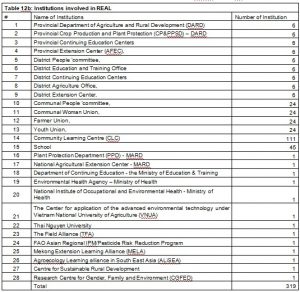
2.8. Monitoring
> Monitoring and evaluation has been conducted at central and provincial level. At the Center, ICERD is overall responsible for monitoring, ICERD reported to the PPD monthly, quarter, and annual of the program.
> At the provincial, Crop Production and Plant Protection Sub Department (CP&PPSD) – DARD as the focal point to gather data on the performance of FFS in districts, communes, and evaluate the results achieved as well as the difficulties and limitations in the process of implementation and recommend to ICERD. Annual survey, snapshot monitoring.
> Workshop improve indicator for monitoring
The workshop was organized in January 3-5, 2017. Total of 5 persons attend the workshop. Participants discussed to develop indicators for monitor for all activities at the field level.
> Field visit
ICERD staff made regular visit to the project sites and the workshops were organized to evaluate and improvement of quality of the field activities.
CP&PPSD’s staff of Bac Giang, Yen Bai and Lao Cai (6 staff) made regular visit to the project sites and the workshops were organized to evaluate and improvement of quality of the field activities.
2.9. Establish partnerships with government agencies to promote PIA and Sustainable Conservation and Utilization of Agro-bio-diversity.
ICERD has supported the target provinces in development of the Community program “Rural Ecological Agriculture for Livelihoods” in collaboration with the government agencies and Reseach Institute including Department of Crop Production, Plant Protection Department (PPD), National Agricultural Extension Center (NAEC) – Ministry of Agriculture & Rural Development (MARD), Department of Continuing Education, Department of International Cooperation – Ministry of Education and Training, Agency of Health Environment, National Institute of Occupational and Environmental Health – Ministry of Health, ORGANIC AGRICULTURE CENTER – Vietnam National University of Agriculture, Thai Nguyen University, Provincial Department of Agriculture and Rural Development (DARD), Community Learning Center (CLC).
Particularly In 2018 ICERD has collaborated with agencies of the Ministry of Education & Training and The Ministry of Health to organize the events at the national level as follows
2.9.1. The Department of Education and Training Hanoi in collaboration with ICERD to organize a Workshop on connect cooperation for Food safety
Workshop was organized on December 27, 2018..
The workshop aims to provide an forum for the participants to know each other to find the safety products providers (from CLCs) supply for the Semi-Boarding Schools, communities, search for alternative of chemical inputs for farming, share experiences on pesticide risk reduction, sustainable agro-biodiversity conservation and utilization application associated with the safe product production.
Participants included 200 people including leaders of Hanoi Department of Education and Training, District Education &Training Office from 4 districts (Me Linh, Soc Son, Dong Anh, Hoai Duc), leaders and officials of 88 CLC of 4 districts (Me Linh, Soc Son, Dong Anh, Hoai Duc), semi-boarding schools have kitchens for students of 12/30 districts of Hanoi, companies providing biological products for the safe farming, Department of Crop Production and Plant Protection under the Department of Agriculture and Rural Development (DARD) of Hanoi.
2.9.2. The Department of Education and Training Hanoi in collaboration with ICERD to organize Refresher Training of Trainers (R-TOT)
Participants included staff of 88 CLC of 4 districts (Dong Anh, Soc Son, Hoai Duc, Me Linh) of Hanoi and teachers of 20 Semi-boarding schools. The aim was to improve knowledge of PIA and conservation and use of agrobiodiversity build the capacity for CLCs in order to organize the FFS on PIA and sustainable conservation of agrobiodiversity. There were four R-TOT organized (5 days / course).
Contents:
> Principles of System Rice Intensification (SRI)
> Pesticides impact on human health and the environment
> Conservation and application of agricultural biodiversity
> Application of biological bedding/bio-mats in livestock to minimize environmental pollution and composting methods.
> Standards and regulations related to safe vegetable production to improve nutrition and health
> Cultivation techniques to enhance the ability to cope with climate change and enhance / improve the ecosystem.
2.9.3. The Department of Education and Training Hanoi in collaboration with ICERD to organize the Inception Workshop of the Project on Building capacity for CLC on PIA, ABD
The Project names “Training to strengthen the capacity of core staff of Community Learning Centers on the use of pesticides, safe growth agents in farming and – contributing to ensuring hygiene, food safety, environmental protection, biodiversity “. Workshop lasted two days (17 and 18 January 2018).
It aims at sharing the experience of organizing the CLC activities of Thailand related to the PIA and sustainable Conservation and Utilization of Agro-bio and Vietnam’s experience in supporting CLCs in adoption of PIA and sustainable Conservation and Utilization of Agro-biodiversity within the REAL project organized by ICERD
Participants included more than 200 people including: Leaders and staff of the Department of Education and Training of Hanoi, Education and Training Office of 4 districts (Me Linh, Dong Anh, Soc Son, Hoai Duc), leaders and staff of 88 CLCs of 4 districts (Me Linh, Dong Anh, Soc Son, Hoai Duc), teachers of 20 semi-boarding schools.
2.9.4. The National Institute of Occupational and Environmental Health – Ministry of Health in collaboration with TFA and ICERD to organize the “Pesticides residues and test kits for food safety Workshop”
The objective of the Workshop was to share the knowledge and efforts carried out in Thailand and build capacity of interested agencies in the uses of test kits to detect pesticides residues in vegetables and fruits and other toxic chemicals used to treat products and planning meeting for interested agencies to review the study plan in Vietnam:
> Sharing information on the current use and impacts of pesticides on health and environment in countries in the region.
> Promote pesticide residue monitoring activities in regional countries.
> Introducing Test kits for detecting pesticide residues.
Contents of the workshop:
> Status of pesticides used and impacts in Vietnam.
> Result of studies of pesticides impacts to children in the region
> Result of studies of pesticides impact to health and environment in Thailand.
> Test kits and Laboratory testing process
> Test kits development and distribution in Vietnam
Test kits: Pesticides residue in blood (Organophosphate and Carbamate) using reactive paper; Pesticides residues in vegetables and fruits using MJPK test kits (Organophosphate and Carbamate); Formalin test kit; Borax test kit; Whitening substance test kit for bean sprouts, bamboo shoot and cow intestine; Anti-biotic test kits for chicken, pork, fish “TBC”)
Workshop was held on November 9th, 2018 at the Vietnam National Institute of Occupational Safety and Health.
Participants: More than 80 persons from government, non-governmental agencies, private sectors, academic, school teachers and farmers. They were: National Institute of Occupational Safety and Health, ICERD, TFA, Ministry of Agriculture and Rural Development (MARD), Ministry of Education and Training, Department of Plant Protection – MARD, Institute of Nutrition, Center for Preventive Medicine / Provincial / City Center for Disease Control with UNESCO, CECAD organizations, IDEA, CGFED, Vietnam Women’s Union …
2.10. Meeting, Forum
> From 2013-2018, ICERD collaborated with central and local institutions (MoET, Ministry of Health, Commune People Committee) to organize the Meetings/Workshop/Forums related to sharing experiences and promoting PIA and ABD, capacity building for CLC.
> ICERD in collaboration with TFA organized a Study Visit on Pesticides Waste Containers Management for the delegates from Laos and Thailand and Cambodia (who were the government officers and CSO to learn the experiences from Vietnam to further lead this development in SE Asia countries. The study visit was taken place from 8-9 October, 2018.
> In addition, ICERD has also attended to relevant regional events (meetings/workshops/forums) annually organized.
2.11. Policy advocacy and strengthening pesticide management
> Training skill on advocacy were organized annually for the key farmers.
> Famer’s advocacy: Convince the Commune Authorities the results from experiment and pilot model through: Report, Farmer’s Field Days , Farmers’ fields as “show rooms”, village’s announce speaker. Farmer groups directly dialogue or through Farmer’s Union, Women’s Union dialogue with commune authorities. Assist the Commune People’s committee to develop the Strategic plan or annual plan for extension of initiatives
> Success stories are served as evidences for designing the ministerial document: “Jointly Circular issued by the MARD and the Ministry of Natural Resources and Environment on Guidelines of collecting, transporting and processing pesticide container after use”.
> Budget allocation from the government (province, commune) as well as CSOs, private companies and community for extension of farmer’s initiatives
> Ministry of Education and Training adopted the “Training Manual on agro-biodiversity, Pesticide risk reduction” and promote the training through community learning centers
2.12. Support young farmer generation
By educating youth through schools, we hope to support an informed and prepared young generation of farmers who consider agriculture as a viable and vital profession.
Students boarding school were trained and practiced to improve the knowledge and skills on ecological agriculture such as cultivation, processing and use of indigenous medicinal plants, vegetable production and crop-livestock integration to strengthen nutrient cycling within farms; alternatives to chemical (composting, bio-bedding, biological control, production of botanical pesticides). Agriculture products produced by students are supplied for the student’s daily meals and the remains were sold to the market, and the proceeds were used to build the student’s fund.
Some success stories
> Youth farmer Utilize Ecological Agriculture: Since 2014 Chien & Nga have received training. Improved knowledge and skills in agro-biodiversity conservation and utilization, System Rice Intensification (SRI), integrated Rice-Fish-Duck farming, Bio-bedding in livestock raising, crop-livestock integration to strengthen nutrient cycling within farms. alternatives to chemical inputs, Chien & Nga decided to switch the “1.2 hectares mono-fish farming” to [Integrated Rice-Fish-Duck Cultivation] with the area of 12 ha, with 32 farmers involved.
> School Students Conservation and Utilization of Agro-Biodiversity: Boarding school in Bac-Ha District has implemented student vegetable gardening & pig raising with successful results. School in Nghia-Lo District, the medicinal herb garden is a place for students to actively learn.
> Ha Noi City: Training for 30 youths (17 female) conducted in 2016, up to now, 9 people (4 female and 5 men) have formed and maintained effective production and market linkages for the vegetables.
> Nine youths (8 female, 1 man) participating in two cooperatives founded by ethnic minority women in Lao Cai Province, maintain conservation and production of indigenous vegetables. Vegetables were sold through various shops, local markets, and supermarkets in Bac-Ha, Lao-Cai, and mostly, Hanoi city.
3. Lesson learned, recommendation
3.1. Lesson learned, recommendation
Ecological agriculture community program needs the mobilization of different sources, sectors:
> Strengthen pesticide management and develop alternative to chemical inputs
> Integrated farming system to enhance interactions between crops, between crops and livestock/animal,
> Domestic waste such as detergent, soap, and animal waste … they also harm the agricultural ecosystems
> suitable seeds
> Landscape approach
> Link to the markets
> Farmers, students and local institutions working together
> Develop sustainable agricultural and rural development strategies
> Review the implementation of Joint Circular 05 in order to improve enforcement.
> At farm level, more efforts need to be made to strengthen the management of empty pesticide containers and adopt sustainable farming practices to reduce pesticide use.
> Inclusion in the law that pesticide companies pay fees for the disposal of empty pesticide containers
3.2. Recommendation:
> Piloting and evaluation of ecological agriculture models, documentation, information & dissemination, propose policy support for promotion.
IV. Activity and Results in 2018
In 2018, ICERD focused on supporting the project target communes of 6 provinces to complete a strategic plan on the promotion of pesticide impact assessment (PIA) and sustainable conservation and use of agro-biodiversity. At the same time, maintain the assistance to target communes to sustain the training activities by mobilizing local resources and farmers.
In 2018, ICERD has also strengthened establishment of the partnerships with government agencies within the country to promote PIA and Sustainable Conservation and Utilization of Agro-bio-diversity, as well as strengthen experience sharing on pesticide management with within and among partners countries, such as ICERD organized a Study Visit on Pesticides Waste Containers Management for the delegates from Laos and Thailand and Cambodia (who were the government officers and CSO to learn the experiences from Vietnam to further lead this development in SE Asia countries.
Other activities such as final national workshop, curricular development, documentation on case study from project site, and support youth return to agriculture production were also conducted in 2018.
1. SUMMARIZE DATA ON ACTIVITIES ORGANIZED IN 2018
1.1. Training activities in 2018 (with all funding sources)
With all funding sources In 2018 there were 2,115 person (Farmer and Student) were trained in FFS on Pesticide Impact Assessment (PIA) and sustainable conservation and use of agro-biodiversity. In which 1,173 Female (55% FM). Among them, the number of trained students is 1,004 including 512 women (51% female), and the number of trained farmers is 1,111 including 661 (59% female) (Table 13). Financial support included REAL’s budget and local capital mobilization to expand project activities.
1.2. Target communities/Community Learning Center (CLC)/Schools in 2018 (with all funding sources)
In 2018 the activities on PIA and Sustainable conservation and utilization of agrobiodiversity has been maintained in 111 communes / Community Learning Center (CLC) and 46 schools within 7 Districts of 6 provinces (Bac Giang, Hanoi, Quang Binh, Lao Cai, Ninh Binh and Yen Bai), of which only 3 provinces Yen Bai, Lao Cai and Hanoi have funding from REAL , the remaining 3 provinces (Bac Giang, Quang Binh, Ninh Binh) REAL did not finance, instead funding was mobilized from local sources and farmers to sustainably develop project activities (See Table 13 below).
In a total of 111 communes / Community Learning Center (CLC) now are maintain PIA, ABD activities, there are 23 communes were supported by REAL and are now sustaining, the remaining 88 communes / CLC within Ha Noi province, began to implement PIA and ABD activities since 2018 with Hanoi’s funding, but technical assistance provided by REAL Project.
Among 46 schools now are maintaining PIA, ABD activities, there are 26 schools (including one boarding school, and two Schools within District Continuing Education Center) were supported by REAL and they are now sustaining; remaining 20 schools /semi-boarding schools began to implement PIA and ABD activities since 2018 with Hanoi’s funding, but technical assistance provided by REAL Project.
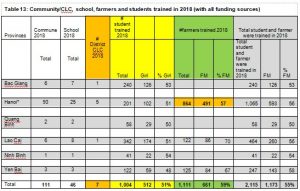
2. Summarize the progress and results of implementation of the approved work plan 2018
> In 2018 there were 41 activities planned and all 41 activities were conducted, achieved 100% of the plan. There were 2,089 person participated in the implementation of the project activities in which 1,147 Female (55% FM), they were farmers, students, and representatives of local institutions (Table 14b). Particularly for Hanoi province in 2018, ICERD had the collaboration and support for Hanoi Department of Education and Training to conduct the training on building capacity on Pesticide Impact Assessment (PIA) and Sustainable Conservation and Use of Agrobiodiversity for 88 CLC and 20 semi-boarding schools (students eat lunch in school) from 4 districts out of 29 Districts of Hanoi.
> In 2018, ICERD has strengthened establish the partnerships with government agencies to promote PIA and Sustainable Conservation and Utilization of Agro-bio-diversity. Such as ICERD has supported the target provinces in development of the Community program “Rural Ecological Agriculture for Livelihoods” in collaboration with the government agencies including: Department of Continuing Education – Ministry of Education & Training, The Department of Plant Protection (PPD)- Ministry of Agriculture and Rural Development (MARD), The Ministry of Health. Particularly In 2018 ICERD has collaborated with agencies of the Ministry of Education & Training and The Ministry of Health to organize the events at the national level as follows:
- a) ICERD and TFA in collaboration and assistance the Department of Education and Training of Ha Noi province to organize “Workshop on connect cooperation: Community Learning Centre (CLC) – school – society in the training and use of the safe products within Hanoi province” on December 27, 2018.
- b) ICERD in collaboration and assistance the Department of Education and Training of Ha Noi province to organize Refresher Training of Trainers (R-TOT) Course for staff of the CLCs and Semi-boarding Schools within Hanoi province. The aim was to improve knowledge of PIA and conservation and use of agrobiodiversity build the capacity for CLCs in order to organize the FFS on PIA and sustainable conservation of agrobiodiversity. There were four R-TOT organized (5 days / course).
- c) Supported the MoET to organize the Inception Workshop of the Project “Training to strengthen the capacity of core staff of Community Learning Centers on the use of pesticides, safe growth agents in farming and – contributing to ensuring hygiene, food safety, environmental protection, biodiversity ” (two days workshop), 17 and 18 January 2018.
- d) Collaboration with National Institute of Occupational and Environmental Health – Ministry of Health and TFA to organize the “Pesticides residues and test kits for food safety Workshop” in Hanoi. The objectives to share the knowledge and efforts carried out in Thailand and build capacity of interested agencies in the uses of test kits to detect pesticides residues in vegetables and fruits and other toxic chemicals used to treat products and planning meeting for interested agencies to review the study plan in Vietnam.
- e) ICERD in collaboration with TFA organized a Study Visit on Pesticides Waste Containers Management for the delegates from Laos and Thailand and Cambodia (who were the government officers and CSO to learn the experiences from Vietnam to further lead this development in SE Asia countries. The study visit was taken place from 8-9 October, 2018.
Progress, performance indicators of approved REAL’s activities plan of 2018 are indicated in the table 14 bellow.
